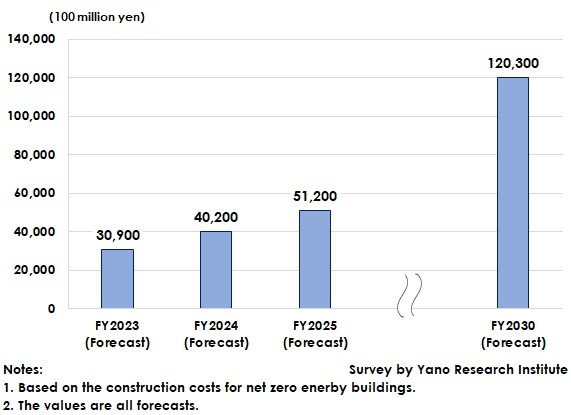No.3322
ZEB (Net Zero Energy Building) Market in Japan: Key Research Findings 2023
ZEB Market Projected to Grow Consistently, Reaching 12,030,000 Million Yen by FY2030
Yano Research Institute (the President, Takashi Mizukoshi) has carried out a survey on the domestic net zero energy building (ZEB) market and found out the trend of elemental technology, the trend of market players, and future perspectives. This paper focuses on the forecast of the ZEB market size until FY2030 based on construction costs of ZEBs.

Market Overview
The government's "2050 Carbon Neutrality Declaration" and the resulting progress of decarbonization management, as well as “the Sixth Strategic Energy Plan” approved by the cabinet in October 2021 stipulating “Securing of energy-saving performance to the levels of net zero energy buildings (ZEBs) or net zero energy houses (ZEH) for newly built constructions after FY2030” and “Step-by-step raising of the energy-efficiency target”, have further improved the environmental recognition by construction owners in recent years.
Meanwhile, major building developers that supply office buildings, etc. have hammered out the policy of transforming their constructions into ZEBs by FY2030, indicating how ZEB designs are widespread to be the standard. In addition, constructions applying to ZEB Ready (*1) and ZEB Oriented (*2) have become lower increments in initial costs than non-ZEB constructions.
*1) ZEB Ready: Buildings that reduce 50% or more of benchmark primary energy consumption, except for renewable energy.
*2) ZEB Oriented: Buildings of more than 10 thousand square meters of total floor area that reduce 30% (for hotels, hospitals, department stores, restaurants, assembly halls, etc.) or 40% (for offices, schools, factories, etc.) or more of benchmark primary energy consumption, except for renewable energy, while introducing yet-to-be evaluated technologies as a measure to realize further energy efficiency.
Noteworthy Topics
Individual Air Conditioning System Drawing Attention as Beneficial in Energy Efficiency
Energy is consumed in buildings for air conditioning, ventilation, lighting, hot-water supply, elevation, etc., among which the heat source to generate heat or coolness mainly for air conditioning occupies 20 to 40 percent of energy consumption, though there is difference in the application of buildings. Air conditioning systems can be categorized chiefly into two, central and individual.
In recent years, buildings that aim to be ZEBs tend to choose the individual air conditioning system. Unlike central systems, individual air conditioning systems can control the operations room by room and floor by floor, which reduces the wasted electricity consumption. Conventionally, individual systems have been applied for small or middle-size buildings because they had restrictions in the length of pipe arrangement. However, the improved pipe lengths applicable have enabled the operations in large-scale constructions.
Future Outlook
Considering the government's target of newly constructed buildings on average is to be ZEBs by FY2030, the ZEB market for FY2030 is projected to expand to 12,030,000 million yen. Because there are many on-going new construction projects already designed to be ZEBs in the initial designing stage, the market is expected to continue escalating.
Research Outline
2.Research Object: Domestic general construction firms, architecture firms, HVAC equipment manufacturers, HVAC, and plumbing/sanitary work businesses, etc.
3.Research Methogology: Face-to-face interviews (including online) by expert researchers, and literature research
ZEBs (Net Zero Energy Buildings)
According to “ZEB Roadmap Examination Committee” at Agency for Natural Resources and Energy of Ministry of Economy, Trade and Industry, a net zero energy building (ZEB) is “a building that uses cutting-edge construction designs to control energy load, utilizes proactive natural energy by adopting passive technologies, and deploys highly efficient facility systems, thereby to achieve significant energy savings while keeping the quality of indoor environment, and also attains the energy independency as much as possible and the balance of annual primary energy generation/consumption to zero by deploying renewable energy.”
<Products and Services in the Market>
Net zero energy building (ZEB)
Published Report
Contact Us
The copyright and all other rights pertaining to this report belong to Yano Research Institute.
Please contact our PR team when quoting the report contents for the purpose other than media coverage.
Depending on the purpose of using our report, we may ask you to present your sentences for confirmation beforehand.